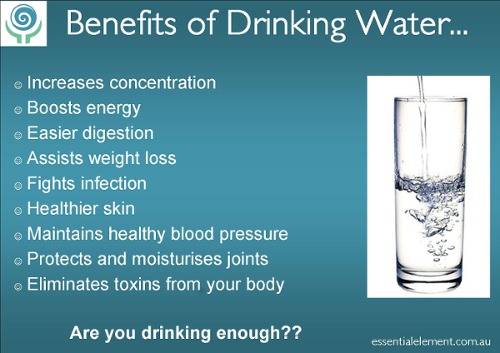How much water do I need to drink and what happens if I don't drink enough?
01 Feb 2025
We all know that water is absolutely essential to life but exactly how much do we actually need to drink? It is recommended to drink 6-8 glasses (1.5-2 litres) a day but is this enough?
From what I can gather, it all comes down to a matter of different factors – the person’s environment, their lifestyle, their diet, etc. For the average adult, the amount of water that is lost through breath, sweat, urine and bowel movements is about 2-2.5 litres a day or roughly 3-4% of their total body weight.The formula I have come across to work out the body’s requirements to replace the daily losses alone is 30ml to every kilogram of body weight. This means that someone weighing approximately 70kgs would need to drink 2.1 litres of water each day on top of the water content they receive from other food and beverages.

So what happens if we don’t drink enough water? Well for starters dehydration diminishes physical and mental performance. As water plays a critical role in metabolism and the elimination of wastes from the body, you may find that your metabolism slows down, you feel sluggish or constipated. There maybe issues with kidney function, blood pressure, transportation and absorption of nutrients, or the removal of toxins from your body. Additionally water intake affects the fluids required for functions such as the lubrication of joints and eyes, the production of lymph which helps to transport immune cells throughout the body, and saliva production which is essential for digestion and maintenance of oral health.
For chronic mild dehydration (meaning it has been happening for an extended period of time and we are talking about a fluid deficit as little as 1-2% of body weight) this causes an overall decline in alertness, the ability to concentrate, impairs decision making, short term memory and reaction times, plus increases feelings of tiredness and headache. One thing to remember here is that the brain is made up of approximately 75% water. When the brain is dehydrated, it slows down and gives a "fuzzy" feeling long before you experience the actual symptoms of thirst.
Generally it is not a good idea to use thirst alone as a guide for when to drink because by the time you become thirsty, it is possible that you are already slightly dehydrated. Additionally, as you get older, your body is less able to sense dehydration and send your brain signals of thirst.Below is a rough guide of the effects of progressive dehydration showing percentage of Body Weight Loss in Water (reference: Nutrition 4th edn, 2011, Insel, Ross, McMahon & Bernstein):
- 1% - Loss of total body fluids triggers thirst
- 2% - Increased thirst, loss of appetite, discomfort
- 3% - Impatience, decreased blood volume
- 4% - Nausea, slowing of physical work
- 5% - Difficulty concentrating, apathy, tingling extremities
- 6% - Increased body temperature, pulse and rate of respiration
- 7% - Stumbling, headache
- 8% - Dizziness, labored breathing
- 9% - Weakness, mental confusion
- 10% - Muscle spasms, indistinct speech
- 11% - Kidney failure, poor circulation due to decreased blood volume
- 20% - Coma and death
Pretty scary huh? Here are a few tips to help keep that water intake up:
- Drink a glass of water 20mins before each meal as well as between meals
- Hydrate before, during and after exercise
- Swap sugar loaded drinks for water
- Drink one glass of water for every alcoholic drink
- Drink at least three glasses of water for every cup of coffee (yes, that is how much of a diuretic coffee is!)
- Add lemon, lime, orange or mint to water for some extra flavour
- Take a bottle of water with you wherever you go
For optimal performance on all levels, grab that water and stay hydrated - your brain and body will love you :-)